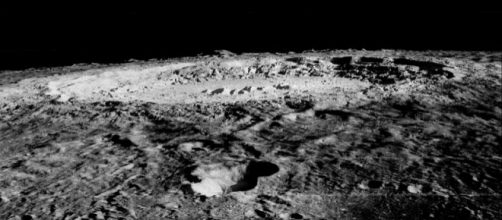Water on the moon is believed to be concentrated at the Poles but fresh studies have revealed that there is an abundance of water below the surface too, probably in underground reservoirs. If this is confirmed, it would be a major step towards colonization of the Moon which can no longer be treated as dry, desolate, rocky and arid. The presence of water would indicate the possibilities of lifeforms and the combination would make it an attractive proposition.
Water on the Moon
Daily Mail UK reports that studies carried out by a team of researchers from the Technical University of Dortmund, Germany has concluded that there is water present all over the Moon and not confined to only the Poles.
In their search for water, they relied on data collected from the Moon Mapping Mission.
The obvious explanation is that there are unseen sources of water, probably reservoirs of water below the surface. Such a discovery would mean colonization of the Moon would be possible and the Moon could act as a stepping stone for future space exploration.
Incidentally, Professor Stephen Hawking indicated that man could establish a station there within three decades and it could help in journeys to other planets. However, availability of water could be a setback because transporting it from the Earth may be a hurdle. Therefore, if it is available in underground reservoirs, it would be a big relief.
Exploiting the resources
NASA sent the first men to the Moon in the 1960s. They were Neil Armstrong and Buzz Aldrin and they landed there on July 20, 1969. Subsequently, there have been any number of missions by international space agencies to capture information about its weather, its composition and its natural resources. Astronauts of Apollo had brought back rock samples with them, and on examination, the samples were found to have similarities to what is available on Earth.
There are different theories to explain the phenomenon but it is a fact that the moon has a wide variety of minerals and natural resources. That added another dimension to explore the moon and some countries have drawn up plans to mine them. There could be missions to extract minerals and if water is available, these could become manned ones instead of being unmanned.
The colonization of the moon would then be a major benefit.
Furthermore, with a mission to Mars also on the anvil, a human colony on the moon would be advantageous because the hopeful settlers for the red planet could use it as a stopover.


